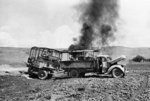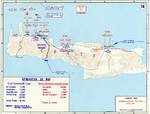
Greece
| Full Name | 8 Kingdom of Greece | |
| Alliance | Allies - Minor Member Nation or Possession | |
| Entry into WW2 | 28 Oct 1940 | |
| Population in 1939 | 7,222,000 | |
| Military Deaths in WW2 | 20,000 | |
| Civilian Deaths in WW2 | 400,000 | |
| - Civ Deaths from Holocaust | 60,000 |
Contributor: C. Peter Chen
ww2dbaseIn years between WW1 and WW2, Greece was marked by instability. The large population migration as the result of the Greco-Turkish War of 1919-1922 saw many civilian deaths, and the 1924 fall of the monarchy would completely reverse itself in 1935. In 1936, the pro-British Ioannis Metaxas took dictatorial control of the nation. In Oct 1940, Metaxas rejected the demands issued by Italy, leading to an Italian invasion and marking Greece's entrance into WW2. Greek troops successfully defended against the Italian invasion and a launched a counteroffensive that penetrated deep into Italian-controlled Albania by the year's end; Germany's intervention in the Balkan Peninusla in Apr 1941 would ultimately result in Greece's defeat, however. Among the final strongholds held by the Allies was the southern island of Crete, which saw a major combined arms assault by the Germans involving 750 glider troops and 10,000 paratroopers from above, and 7,000 troops delivered by sea; the losses suffered in this invasion would lead to Adolf Hitler's decision to ban the use of airborne troops on a major scale for all future campaigns. The final remnants of British and Greek troops were evacuated by sea from Crete to Egypt by Jun 1941.
ww2dbaseUnder occupation, Greece was divided into three occupation zones. The Italians took control the bulk of the main landmass of the country thus giving them control of the entire Adratic Sea and Ionian Sea region, while the Bulgarians took control of the northeastern corner in order to gain ports on the coast of the Aegean Sea. The Germans took strategically important locations such as western Crete, the Athens-Piraeus region, and the Thessaloniki region. Chronic shortage of food and other basic supplies caused extreme hardship to Greek civilians during the occupation. As early as the winter of 1941 to 1942, a great many Athenians (estimates ran as high as 300,000) died from starvation and mal-nourishment (the "Great Famine"); the situation would be alleviated somewhat in summer 1942 when the International Red Cross was able to bring in supplies. Armed resistance by the Greeks began early in the occupation; though locally effective, some of the resistance groups saw as much fighting against each others as against the occupation administration. Axis deaths and damages attributed to partisan attacks often led to deadly reprisals. On 16 Aug 1943, for example, the 317 inhabitants of the village of Kommeno were rounded up and executed for the suspicion of partisan support. In another instance, between 14 and 16 Sep 1943, about 500 civilians were killed in the Viannos-Ierapetra region on Crete by troops of German Army 22nd Air Landing Division. Bulgaria, which annexed its share of occupied Greece officially within its borders, was particularly brutal when provoked, as its ultimate goal was to resettle Thrace and Macedonia with its own population. For example, a uprising which began in Macedonia 28 Sep 1941 was quickly put down by Bulgarian Army troops, after killing 3,000 resistance fighters; in the subsequent weeks about 15,000 additional Greeks, said to have aided the uprising, were rounded up and executed. In all, it was estimated that about 70,000 civilians were killed by the Germans, Bulgarians, and the Italians during the occupation. In 1943, when the Italians signed an armistice with the Allies, German troops quickly marched into the Italian occupation zone and took control, fighting the Italians on many occasions.
ww2dbaseOf the 300,000 to 400,000 civilian casualties of war, 60,000 of whom were Jews. Anti-Jewish measures began early in the occupation, but it was not until Mar 1943 that the Bulgarians and Germans conducted large scale deportations, many of whom would end up in Auschwitz and Treblinka in occupied Poland, and many would never return.
ww2dbaseThe Germans ruled its portion of occupied Greece through the façade of a puppet government under the nominal leadership of Georgios Tsolakoglou, Konstantinos Logothetopoulos, then Ioannis Rallis as prime ministers.
ww2dbaseThe several thousand Greek troops which had fled Crete to British-controlled Egypt formed the Royal Hellenic Army in the Middle East. After training in British Palestine, Greek troops participated in the Second Battle of El Alamein in Egypt, and later the Battle of Rimini in Italy. Greek Navy vessels that avoided destruction during the German invasion joined the British Royal Navy; many of them would serve as convoy escorts across the globe during the war. Most of the few air force personnel who escaped Greece would join the Allied Desert Air Force.
ww2dbaseWhen Soviet troops neared, German troops began withdrawing northward in 1944 to avoid being trapped at the southern end of the Balkan Peninsula. Seeing a strong communist force already forming in Greece and fearing its possible post-war success, British troops landed in Athens in Oct 1944. Small pockets of German resistance, generally on the islands in the Aegean Sea, would not cease until the final days of the European War in 1945.
ww2dbaseAfter the war, Greece gained the Dodecanese Islands from Italy. Between 1946 and 1949, Greece fell under a state of civil war, which many viewed as the escalation of the in-fighting that began during the Axis occupation between royalist and communist resistance fighter groups. With the United Kingdom and United States backing the royalists and the communist governments of Albania, Yugoslavia, and Bulgaria backing the communists, the Greek Civil War was among the first acts of the Cold War in Europe.
ww2dbaseSource: Wikipedia
Last Major Update: Feb 2014
| Events Taken Place in Greece | ||
| Balkan Pact | 9 Feb 1934 | |
| Balkans Campaign | 28 Oct 1940 - 1 Jun 1941 | |
| Battle of Matapan | 27 Mar 1941 - 29 Mar 1941 | |
| Dodecanese Campaign | 8 Sep 1943 - 20 Nov 1943 | |
| Ships | ||||
| Elli | Kilkis | Lemnos | Papanikolis | |
| Weapons | ||
| 75 mm Schneider-Danglis 06/09 Field Gun | ||
Weather
WW2-Era Weather Data for Greece
Photographs
 |  |
 |  |
Greece in World War II Interactive Map
Please consider supporting us on Patreon. Even $1 per month will go a long way! Thank you. Please help us spread the word: Stay updated with WW2DB: |
Visitor Submitted Comments
28 Jan 2014 06:42:16 PM
We haven't forgotten the Battle of Kalamata in Australia. The famouse ANZAC VC winner saying "Retreat? F*** That"
11 Feb 2015 05:07:05 PM
I agree. Why is Kalamata not mentioned? What what I read it was significant. I am specifically researching it today as my father was captured there in WW2. I have found mantion in many other places,but it appears it is not on this page.
11 Feb 2015 08:04:34 PM
You can find a bit more on Kalamata on the WW2DB feature article about the fighting in the Balkans (http://ww2db.com/battle_spec.php?battle_id=36) and on the page dedicated to the happens of 28 Apr 1941 (http://ww2db.com/event/today/04/28/1941). Thank you.
29 Aug 2016 02:37:35 PM
Three cheers for the great people of Epiros, the first to encounter the enemy in WW2
3 Jul 2017 02:42:55 PM
My Dad also lived threw those times and i can't seem to find anything on kalamata and surounding towns during that period
26 Dec 2017 02:38:16 AM
A Nazi patrol in occupied Greece once spotted a bearded man wandering in the mountains, ordered him to stop and lie down, and when he did not comply, they shot him.
Since he was still walking unharmed, they approached him shouting and emptied their machine guns on him.
Bullets kept missing him, and the man reached for his pockets and presented all of their bullets.
Stunned, they let him walk away.
Later on, the man arrived at a small village where he told peasants what had happened, and showed the fired Nazi bullets.
Signed testimonies in Greece confirm the fact, and were all gathered in a published book, together with other amazing stories about this man.
https://www.scribd.com/document/113829393/%CE%A7%CE%91%CE%A1%CE%91%CE%9B%CE%91%CE%9C%CE%A0%CE%97%CE%A3-%CE%9F-%CE%94%CE%99%CE%91-%CE%A7%CE%A1%CE%99%CE%A3%CE%A4%CE%9F%CE%9D-%CE%A3%CE%91%CE%9B%CE%9F%CE%A3-%CE%9C%CE%91%CE%A4%CE%98%CE%91%CE%99%CE%99%CE%9A%CE%9F%CE%99-%CE%9A%CE%91%CE%9B%CE%91%CE%9C%CE%91%CE%A4%CE%91-%CE%9C%CE%95%CE%A3%CE%A3%CE%97%CE%9D%CE%99%CE%91%CE%A3
We are searching for surviving soldiers of that specific German patrol, their commanding officer at their base, other witnesses, that can verify this incident, for historical purposes.
Thank you in advance.
13 Apr 2021 06:10:27 AM
Can anyone help me locate veterans or family members of those who served in the Italian campaign.
This is material for a book so any photos, diaries, letters, postcards etc., that I can reproduce into print please contact me. I think it is vital Greece be included in the fighting during the Italian Campaign 1943-45.
Thank you
All visitor submitted comments are opinions of those making the submissions and do not reflect views of WW2DB.

- » Wreck of Teruzuki Found (27 Jul 2025)
- » USS Orlean's Bow Found (22 Jul 2025)
- » The Emperor of Japan Planned to Honor WW2-era Japanese POWs in Mongolia (4 Jul 2025)
- » US State Lawmaker John Winter Caught Using Racial Slur "Jap" and Apologized (11 Jun 2025)
- » US Government Plans to Purge WW2 Information (17 Mar 2025)
- » See all news
- » 1,182 biographies
- » 337 events
- » 45,115 timeline entries
- » 1,248 ships
- » 350 aircraft models
- » 207 vehicle models
- » 376 weapon models
- » 123 historical documents
- » 261 facilities
- » 470 book reviews
- » 28,413 photos
- » 365 maps
Fleet Admiral Chester W. Nimitz, 16 Mar 1945
27 Oct 2013 05:10:36 PM
Is the Battle of Kalamata not worthy of a mention?